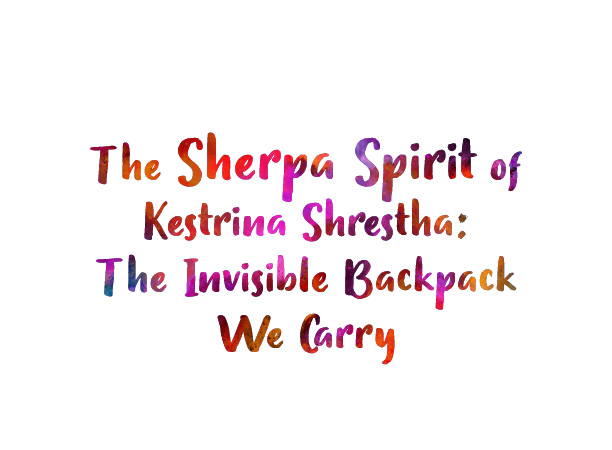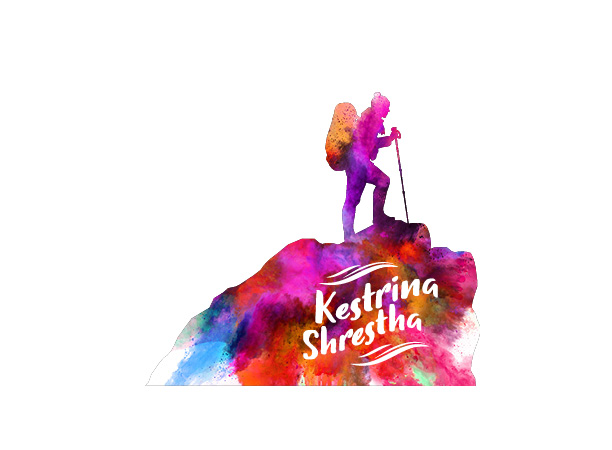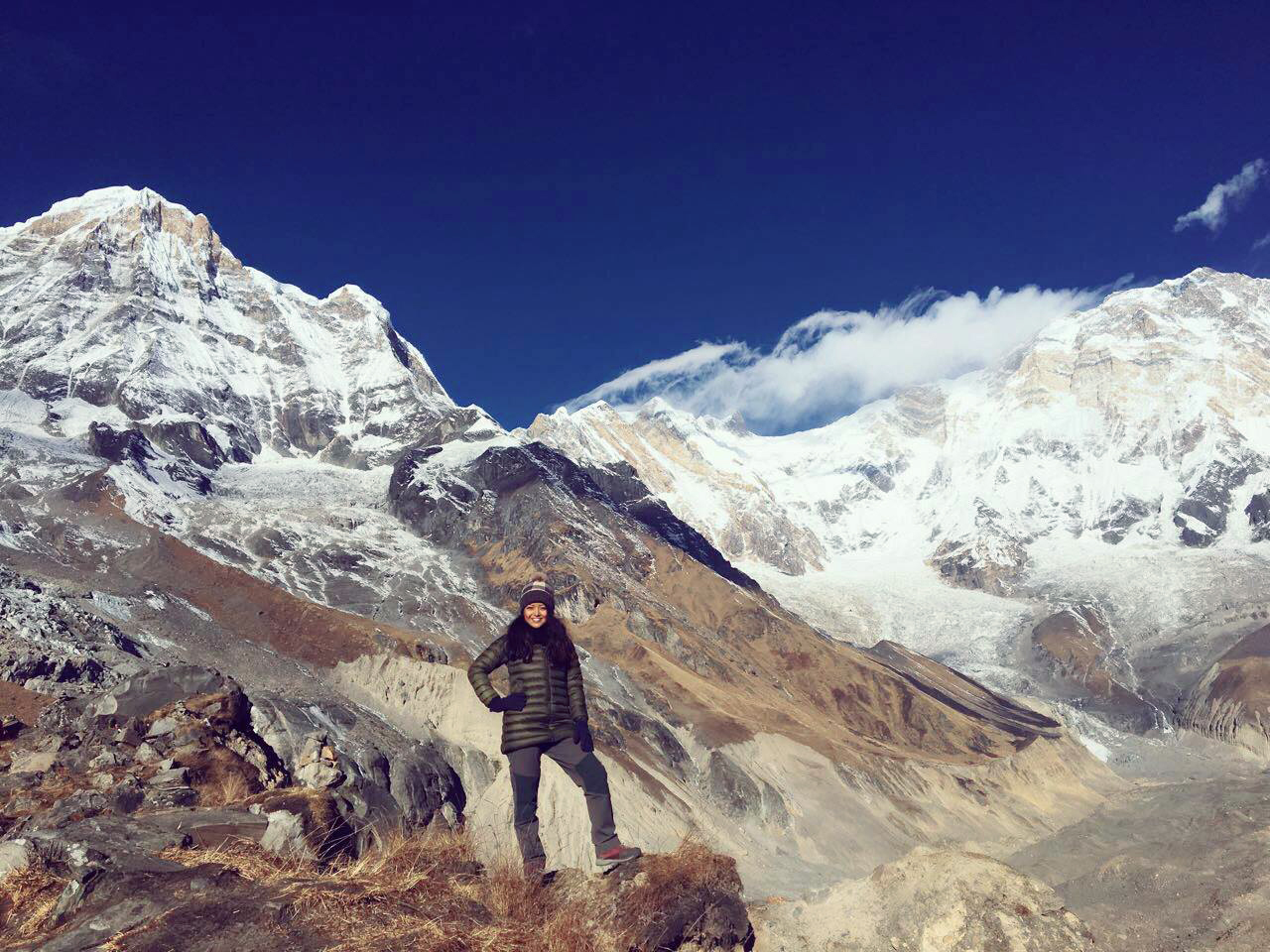Kestrina Shrestha

By: Cynthia Adams | Photos By: Nancy Evelyn
Kestrina Shrestha understands singularity.
While she pursued a master’s in College Student Affairs Administration, she often felt like she was breaking new ground or pressing beyond a barrier—something she has frequently done since returning to the U.S. as a teenager after 16 years living with her family in Nepal.
Appearances, as the old saw goes, are deceiving.
Despite her youthful looks, Shrestha points out she was also the oldest student in her master’s program. In addition, she was the only Asian female in the program, and the only married student. She laughs as she points out being older, female, married, and feeling like an immigrant even if she is native born here.
Then there is her love of climbing and athletic challenge. While she doesn’t fit the student profile of “gym rat” wearing lycra and track shoes, Shrestha is surely among the fittest students.
One so fit she thinks hiking the Annapurna Machhapuchhare trek is not very ambitious. Even tour leaders and organizers describe the climb as “strenuous” and acknowledge the challenge.
Shrestha returned to Nepal at the end of 2017, undertaking a climb that is 10 days there and back to a base camp established for the awe-inspiring mountain named Machhapuchhare. Also nicknamed “Fish Tail,” the mountain summit is protected given its spiritual and historical significance.
“Whenever you’re trying to do an expedition, it requires willpower,” she admits. “The will that you will do your best to get through.”

During the TEDxUGA Student Idea Showcase last November, Kestrina Shrestha walked onto the stage with a sizeable black backpack that she had carried into the Annapurna Himalayas during an ambitious climb in December of 2017. The backpack, as she explained, symbolized her preparation and equipping herself for the challenge of graduate education. Shrestha is making plans to pursue a doctorate after time out to work. As a graduate assistant working with multicultural services and programs in the College of Student Affairs Administration, she had an affinity with international students from all backgrounds. The TEDxUGA Student Idea Showcase gives participants the opportunity to present their “ideas worth spreading” and a chance to speak at UGA’s larger TEDx event in the Spring.
What is in Your Backpack?
Taking the stage at UGA’s Fine Arts Theater, Shrestha plunked down a large backpack. She lugged the pack for 10 days while hiking in the Annapurna region of north central Nepal.
Inside the pack, weighing about 22 pounds, was everything she would require—to wear, eat and drink—for the entire journey.
In the first portion of her talk to a packed audience, Shrestha described the experience of trekking to the Nepalese base camp of Annapurna.
The altitude was 13,550 feet.
Then, she asked the audience, “What is in your backpack?”
Shrestha used the analogy of essentials in an invisible backpack, to prompt the audience to consider what would make their own graduate school journey successful.
The contents of her backpack were carefully considered. Food, warmth and safety were the primary concerns.
Yet she used the literal trek to inform the figurative ones that humans undertake lifelong.
“I believe everybody carries an invisible backpack,” she said in the summary of her presentation. “A lot of times, people feel stuck in their lives because they are carrying a load they cannot handle.
In lending her philosophy for a happy, successful life, Shrestha shared the backpack metaphor, suggesting a means to manage day-to-day stresses of American life.
“Are you carrying somebody else’s load?” she asked the audience.

Awe-inspiring Machhapuchhare Machhapuchhare, meaning “fishtail”, is a mountain situated in the Annapurna massif of Gandaki Pradesh, north-central Nepal. Its highest peak has never been officially climbed due to the impossibility of gaining a permit from the government of Nepal.
Summiting a Different Mountain “Personally, the current effect of this pandemic has mostly been in my job hunting process,” Shrestha writes, having graduated in May. “I am rigorously applying and interviewing for jobs. Since all job interviews are now held online, it is unfortunate that job seekers are unable to meet their potential coworkers and supervisor(s) in person, and vice versa. I recently had a three-hour long Zoom video interview which was initially supposed to be an on-campus interview.” “The corona virus is a biological threat, and if you think about it, right now it really is about the survival of the fittest! The fact that we are saving lives by staying home says a lot about how we are all connected as humans. More than social distancing, I see it as social solidarity.” https://en.wikipedia.org/wiki/Machapuchare
In Kathmandu
Shrestha was born in America. Her family returned to their native Nepal when she was three months old. Her parents are Hindu and Buddhist, and wanted their child to experience a traditional Nepalese life with its rich, ancient culture.
Shrestha learned to love the natural world, living in the bowl-like hollow of Nepal’s largest city and capital, Kathmandu.
The city is rimmed by mountains, and was once heavily forested. “‘Kath’ means wood, ‘mandu’ means ‘place’, a word originating from ‘mandapa’” she explains.
“It literally means ‘a place of wood,’” says Shrestha. (The official motto is, “My legacy, my pride, my Kathmandu.”) The family lived midst natural beauty, surrounded by temples and ancient pagodas designated as World Heritage sites.
Shrestha returned to the States in 2007 as a teen, while still a high school student.
What she first discovered about her birthplace was expressed in two words: “culture shock.”
As she slowly adapted, she also learned to stop asking “Why me?”
She points out that unlike most foreign students, she had the benefit of citizenship. Nonetheless, Shrestha spoke and mastered English as a second language.
She earned her undergraduate degree at Illinois State University before completing her master’s at UGA this spring. Her husband, a software engineer working in Atlanta, lived in Nepal as a teen before moving to Singapore, and later coming to Texas A&M for undergraduate school. He received his master’s from North Dakota State University.
Accepting Challenge
The hike undertaken at the end of 2017 to Annapurna, a place spared the crush of tourism because ascent to the top is forbidden, is one that remains important for Shrestha. She respects the journey, even the lessons of discomfort.
“It is such a beautiful feeling when you can call an experience your own,” she says.
Shrestha acknowledges the challenge first required inner will.
“You need physical strength, not bulk,” she says. “Taking the first step, being there,” was the most important piece required.
Her sister and cousin began the journey with Shrestha, but all three kept their own pace, typically meeting up only at the end of the day.
As a full moon rose over the base camp, she left her tent to sit in frigid cold, suffused with awe. “I was in Annapurna, looking at the Machhapuchhare,” she remembers. Shrestha understood on a fundamental level that this moment was transcendent. As the moon climbed, she felt she achieved a different level of experience.
Shrestha explains what she felt most deeply was joy.
The new year dawned during this trek and became what she calls her “best New Year’s Eve ever.” On every level, marking a new year was momentous, spent within environs described as some of the most remotely beautiful and least spoiled on Earth.
“It felt like there was no time,” she explains.

“Behind Every Mountain There Are Mountains.” says Shrestha. “I really like this quote!” The expression is translated from the Haitian proverb, “Deye mon, gen mon,” and is associated with medical anthropologist Paul Farmer.
Consciousness and Choices
The whole of the experience in the Himalayas had been instructive.
But equally significant were the initial events that unfolded when Shrestha first returned to the U.S. as a teenager dealing with the whole dynamic known as culture shock.
Those years of re-integrating into American life were difficult, important times, an invisible challenge even for an English speaker. She kept a journal, and still does, recording “to dos” much like a bucket list.
Living consciously remains her first and last aim.
She does not parse out one experience over another. Consciousness is demanded of everything that she undertakes. Marriage, much like graduate studies, is another mountain that requires consciousness, Shrestha says. So do our goals. Despite the pandemic, she is resolute, actively seeking opportunities in higher education. Her kinship with international students has deepened.
And so, in the making of a bucket list, literal mountains figure into the nature lover’s plans. Shrestha hopes another significant climb is in her near future.
“From Kathmandu to the base camp of Everest is a 15-day trek,” she says. “I have talked about it to my husband,” she says.
Consciousness requires envisioning, planning, preparing.
And Shrestha already knows exactly what to pack.

Photo Courtesy of Kestrina Shrestha








